Interview with RJ Barker (THE WOUNDED KINGDOM)
Warning: this interview contains spoilers for the Wounded Kingdom trilogy!
RJ Barker lives in Leeds with his wife, son and a collection of questionable taxidermy, odd art, scary music and more books than they have room for. He grew up reading whatever he could get his hands on, and has always been ‘that one with the book in his pocket’. Having played in a rock band before deciding he was a rubbish musician, RJ returned to his first love, fiction, to find he is rather better at that. As well as his debut epic fantasy trilogy (beginning with AGE OF ASSASSINS), RJ has written short stories and historical scripts which have been performed across the country. He has the sort of flowing locks any cavalier would be proud of.
The third and final book of the Wounded Kingdom trilogy, KING OF ASSASSINS, was published in August 2018.
How did you feel when you wrote the final words of King of Assassins, and you knew that Girton and Merela’s story was complete ?
Well, my first actual thought was ‘Yes, I’ve nailed it.’ It felt right. I’d always had a very clear idea of the main story that ran behind the plots of the three books and I was really pleased to have made it all work out, especially when I am making it up as I go along a lot of the time. I know some writers feel a sense of loss after finishing a trilogy but I’m not really that sort of person, I’m always looking ahead, so there was a sense of accomplishment, that I had managed to bring everything together in the way I wanted to, and I thought it had real emotional punch which was what I wanted. Once I’ve finished a story, my part is over. I’m not even that bothered about getting copies of the books. It’s a thing for other people then and my interest is more in what people get out of it.
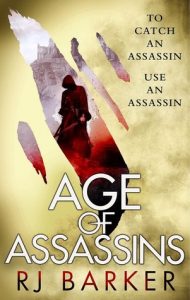 Describe your overall experience with your first published series. What did you enjoy? What were the challenges and, most significantly, what have you learned?
Describe your overall experience with your first published series. What did you enjoy? What were the challenges and, most significantly, what have you learned?
I enjoyed everything really, the whole process. Even when it’s hard, it’s new stuff and I like new things. And I’ve met loads of new people who are great and been places I would probably never have gone to otherwise. As for stuff I’ve learned, not sure. I’m not a very inward looking person, I tend to learn things all the time and just sort of roll it into my ongoing experience of life, but I don’t think about it much. I’ve kind of had solidified what I thought anyway: most people are good and will be kind to you if you’re kind to them.
What did you set out to accomplish when you created Girton Club-foot as the central character in the series? He’s clearly not your typical assassin, and despite the title, this is not a typical assassin tale.
I wanted to tell the story of a king as seen from the sidelines, by someone who maybe would never turn up in the history books, and an assassin made sense in that context. I also wanted a detective, and that had to be someone who could sneak about and had a reason for doing that and knew how to do it and again that made an assassin a good choice, though they aren’t assassins of course, they’re much closer to ninja (as the warriors are much closer to Samurai). But ninja has such a strong association with black-clad warriors that assassins seemed a bit more freeing. At the same time they are definitely not books about the art of murder, so assassin is a bit of a cheat. If you are reading this and were a bit let down by that, sorry.
In 3 books, we’ve seen Girton, Merela and the entire cast age physically and emotionally. As a Psych major I’d call it a longitudinal study. Which version of the characters did you find most fulfilling to write? Why did you choose such long gaps in the storytelling?
There’s no favourite version to write really. Each had its own challenges and rewards. In Age of… I was writing a book from a very simplistic point of view and that was fun. Blood of… was probably the most frustrating because Girton is so annoyingly wrong for most of it and I wanted to shake him and say ‘STOP IT.’ But of course I couldn’t because part of the point of the book is that he can’t see what’s in front of his face, and his refusal, or inability, to understand that you cannot simply go it alone and his refusal to see that people can and do change repeatedly trips him up. Then King of… was a really different sort of challenge because I knew nothing about the plot of the actual book. Nothing. For the first two I’d had a rough idea but for the last I only knew where I had to get to in the larger story, not on the more concentrated plot of the novel.
As for the big gaps, a lot of that is to do with getting bored quickly. A big gap lets me re-invent the world each time so I don’t feel like I’m doing the same thing in the same place with the same people. And the story spans a long time and that’s necessary, but each book as it was primarily a murder mystery only spans a matter of weeks at most. So I needed the space for relationships to change and events to change so we see the stone thrown, then in the next book we see the effects of the ripples. And as I said above, I wanted to tell the story of a king, who traditionally may be the hero in a fantasy book, from a sidelined character and I always intended to do it through three pivotal moments, both for someone looking back at history and personally for Girton.
Aydor is one of my favorite characters in the series, and perhaps in all of literature (and I’m sure I’m not alone). Again without spoiling too much, tell us a little about your experience with this character, and what inspired him.
He’s Girton’s mirror in a lot of ways. In the first book his and his mother’s relationship is the opposite of Girton and Merela’s, a biological mother and child but incredibly dysfunctional. And we see him in a very simple and two-dimensional way because that’s how Girton sees him, but in writing that book I felt quite sorry for him, because if you read between the lines it’s clear he was weak and frightened. He never makes his own decisions. But even knowing that, I planned to kill him off at the beginning of book two cos he was a bit of a third wheel. And then I wrote the speech and I think it must have been sitting in my subconscious cos I stopped writing for a few days to think about him and what I realised he was. Redemption is a very powerful thing, and forgiveness an even more powerful and important thing and Girton cannot forgive himself, because he doesn’t think it’s possible. I needed a way to show that it is.
Much of your series deals with the concept of magic as a curse. Something responsible for “souring” the land. We have landsmen executing sorcerers, those with magical abilities stifling their gift. Why did you choose this anti-magic theme?
I’ve always thought of magic as a metaphor for earthly power and that is generally a corrupting force. It’s so easy for people who have always been rich or powerful to fail to see how hard life can be for those not as lucky – and it is often luck, right thing, right time. I’m also often struck by how many people I’ve met who are powerful and rich but aren’t happy, they just seemed weighed down by a need to be more powerful or more rich. And the corrupting influence of power is one of the themes running through the book. Magic is just a facet of that. Eagle-eyed readers may notice that the only character who gets a happy end is the one who walks away from power.
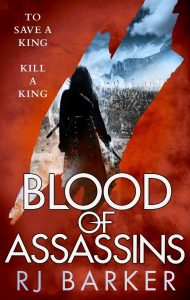 At many points in the series, there are emotionally resonant moments. Quieter moments dealing with love, friendship, and loss. Did you set out to make the hardest and most cynical shed at least a few tears? How important are these themes in your own life? You clearly capture something resoundingly human and vulnerable.
At many points in the series, there are emotionally resonant moments. Quieter moments dealing with love, friendship, and loss. Did you set out to make the hardest and most cynical shed at least a few tears? How important are these themes in your own life? You clearly capture something resoundingly human and vulnerable.
I love people and I always have done and I think this comes from that. You want your characters to seem as real as possible and to do that they can’t be cardboard cut-outs, and I think it’s those moments that make us human, when you are scared, or hurt, or sad or grieving. I think, though in many ways the books are quite dark, in many ways they are quite hopeful books. They are about people who believe in doing what is right even though that costs them so much personally.
Age of Assassins is more or less a coming of age story which features a romantic theme for Girton. These romantic themes are not a focus of the books to follow. Did you consider this a risky move? Why did you decide to forfeit this subplot?
This answer is going to be HUGELY SPOILERY. There’s a couple of things going on here. Partly, Girton goes from being utterly alone and knowing no one his own age into FULL ON TEENAGE EXPERIENCE. It’s all new to him and I wanted it to be something overwhelming. Occasionally someone will say in a review something along the lines of ‘Oh, doomed romance, saw that coming,’ but like a lot of things in book one it’s a simple and familiar idea that then goes on to be explored further in the other books. It may be I’ve been too subtle with it, but its all tied up with the idea of magic and how and who it should work for, and how and who it is made to work for.
Then there’s the fact that Girton is a very moral character who in many ways doesn’t approve of who and what he is, but there is no one else who can do it and he feels he is needed to prop up a greater good. But I think he doesn’t believe he deserves the normal small happinesses of life that most people take for granted. He’s a hugely tragic character, really.
In each book, Girton and his master Merela Karn fulfill different roles to each other. Can you describe the dynamic of master and apprentice as it shifts from Age of Assassins to King of Assassins?
This is a big thing. I mean, what we’re seeing is the relationship of parent and child. In the first book he’s hugely immature and almost entirely dependent on her. He doesn’t second guess her and she is, in many ways, invulnerable as far as he is concerned. He’s always telling us how she is the best assassin that’s ever lived – but you find out he’s never met any others, he doesn’t actually know that. It’s blind faith on his part. Then in the second book he’s a lot more aware, he’s pushing against the rules, he doesn’t like them or think he needs them. but most of all, he’s scared. He knows now the world is not how he thought it was and that Merela is not invulnerable, and she can be taken from him and she is all he’s ever had to rely on (Xus apart). And all his nightmares come true in this regard, she’s not only incapacitated but she might actually leave for other reasons. And he tests her love as hard as possible in that book. Then in the final book, he’s an adult and she is more elderly and maybe he’s looking after her as much as she’s looking after him in some ways (she limps now, he almost never mentions his disability). They understand one another and there is a deep and abiding love and respect. He has, in many ways, surpassed her, but he will never see or believe that and she is only ever proud of him, never threatened. It’s a really healthy parent and child relationship, within the parameters of professional murderers.
I’ve heard you say readers might want to smack Girton in Blood of Assassins. Tell us a little about the awkward transitional period that led to his fulfillment as a character.
NOT JUST READERS. It was always part of the plan, build up credit for Girton in book one and then spend it in book two. One of the themes in the books is how fear can weaken us, how refusing to face up to a thing, of not knowing, can be worse than actually facing what’s coming. There’s that wonderful line from ‘Dune’, “fear is the mind killer,” which I like, but I’d also say that the longer you put a thing off, the more terrible that thing will grow to be in your mind. I suppose it’s a side effect of being ill and having lots of unpleasant medical fun, you end up with a very ‘just get it over with’ mindset. And I think that can be healthy but it’s something you need to learn and Girton is going through that process. He’s also wallowing in self pity. In fact, he’s he’s so busy feeling sorry for himself and being pre-occupied with himself that he can’t see what is in front of his face and it makes him hugely frustrating. But it’s meant to be, because it’s all about ratcheting up tension throughout the book and I like to write in a way where the reader is ahead of the character, which creates more frustration and tension. And he’s, mentally, a teenager, and as anyone who has been one or knows one can tell you, teenagers are awful creatures.
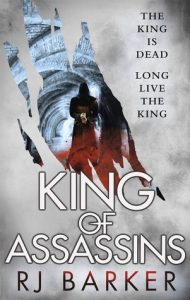 The battle scenes become more cinematic and bear more weight as the series goes on. What were some of your own influences when it comes to these types of choreographed battles?
The battle scenes become more cinematic and bear more weight as the series goes on. What were some of your own influences when it comes to these types of choreographed battles?
I can’t imagine anything more terrifying than being in a battle. Especially battles at this sort of historical time where it’s really organised chaos. The image in my head is always the battle in Akira Kurasawa’s Seven Samurai where it’s just chaos, people flow like water and you can’t imagine anyone in their right mind would want to be involved in it. I don’t think violence should seem like fun. Girton doesn’t enjoy it, he’s just very good at it (within his skill set).
Having written and completed a major epic fantasy series for a major publisher, what advice can you give to aspiring authors looking to make a career in writing ?
‘Don’t quit’ is the big one. You will probably fail multiple times (I definitely have) but as long as you don’t quit you haven’t really failed, you’ve just taken another step forward. And secondly, only you will know how you write. Other people can introduce you to how they write but that doesn’t mean it will work for you, so nothing is gospel. (I have a long standing policy of ignoring anyone who is SURE they know the only way.). Being a writer is a weird mix of being ready to listen to what everyone thinks and take that on board and being full of yourself enough to say, ‘no, I’m going to do this X way.’ Somewhere along that tightrope is a place of balance where you’re doing what you enjoy and what other people want to read.
Did you take a bit of a vacation after King of Assassins’ release? What’s been taking up your time?
I don’t really stop writing, it’s what I do for fun so I just carried on writing stuff that I thought might be enjoyable. I’ve known what I wanted to do next for quite a while so I just rolled straight into that.
What’s next for you creatively? Will you ever visit this world again?
I find this world really easy to write. It makes sense to me and I can just slip into it without much thought and in a way that’s dangerous for me because I am really lazy, so I prefer to push on to something new. And I get bored very quickly, I need to be doing new things or I will tail off and stop being invested. So I am doing a totally different thing involving big ships and a world built from the ground up. My agent said it was totally different but still recognisably me, which is good, I hope. You never know what people will think of a thing until you’ve done it, do you?
In retrospect, aren’t you glad you didn’t decide to name your main character Gorton as you had once conceptualized? Had that been the case I’m sure you wouldn’t be writing that second Orbit series and I certainly wouldn’t be interviewing you 🙂
Heh, yes. It was totally the wrong name. A lot of the time I write with placeholder names in and this sort of awareness that something isn’t right but I sort of rely on the fact that some sort of happy accident will serve up to me the right thing.
Thanks for joining us , RJ, and good luck with the new project!
RJ Barker is the author of the WOUNDED KINGDOM trilogy. All three books are available now.

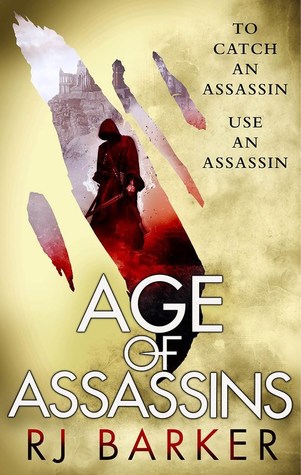
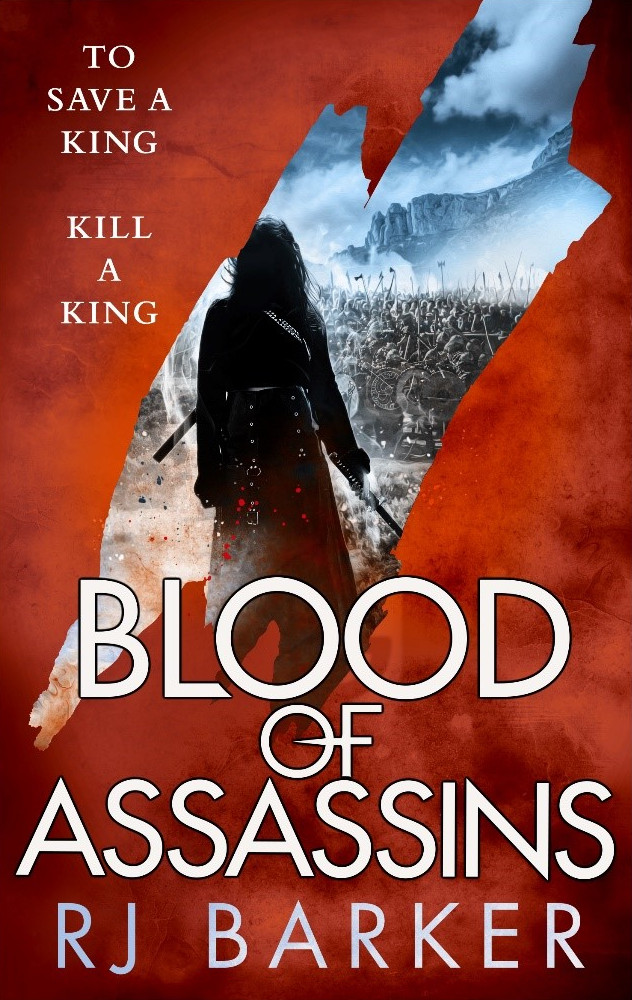
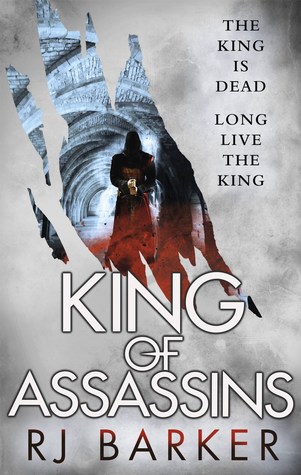
[…] Michael Gruneir, Interview with RJ Barker (The Wounded Kingdom), 2018 <https://fantasy-hive.co.uk/2018/11/interview-with-rj-barker-the-wounded-kingdom> [consultato il 6 ottobre […]